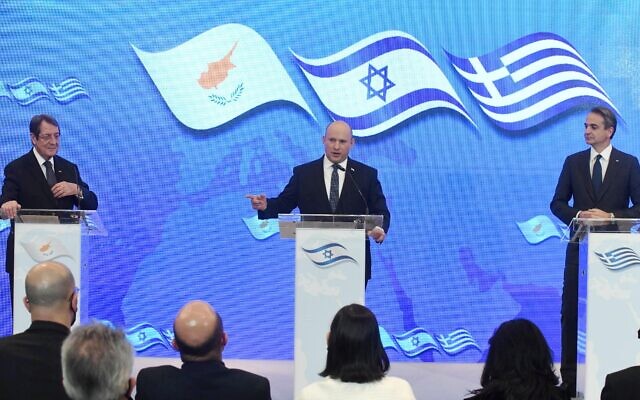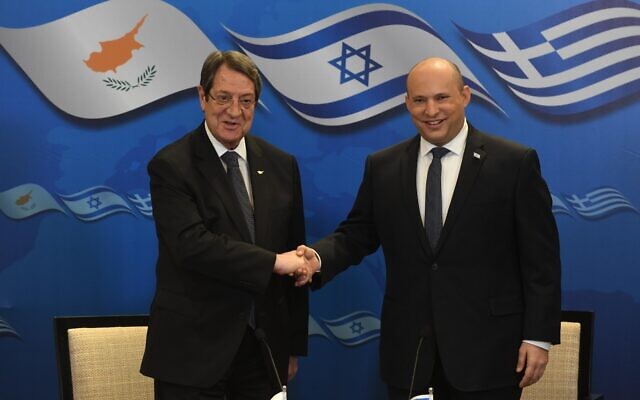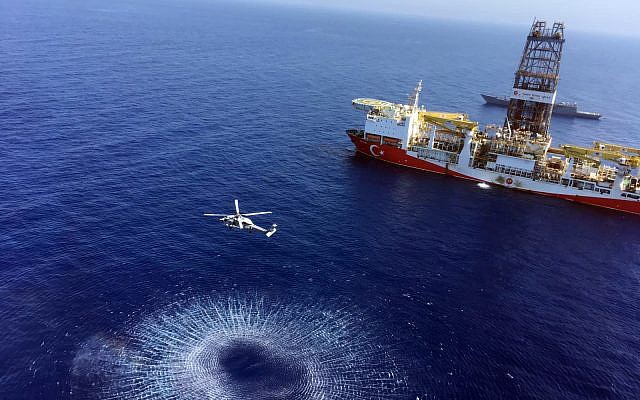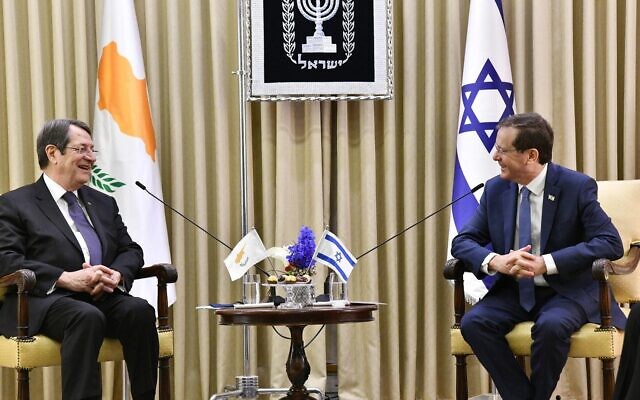PM alludes to ongoing military campaign as he heads into summit with Greek and Cypriot leaders; vows, ‘We will continue to act’

Hours after Syrian media accused Israel of striking the port city of Latakia, Prime Minister Naftali Bennett said on Tuesday that the military was constantly fighting “bad forces” in the Middle East.
“We’re pushing back on the bad forces of this region day and night,” he said in English alongside Greek Prime Minister Kyriakos Mitsotakis and Cypriot President Nicos Anastasiades. “We won’t stop for one second. This happens almost daily.”
“In the face of destructive forces we will continue to act, we will be persistent, and we will not tire,” Bennett pledged.
Turning to the trilateral relationship, Bennett said that the regional EastMed Gas Forum — which includes Israel, Egypt, Greece, Cyprus and the Palestinian Authority — was progressing.
“We are expanding our ties in the fields of security, the economy, technology, tourism, and emergency services,” he said, referencing mutual aid provided over the summer in the face of forest fires in all three countries.
“This trilateral alliance between Israel, Cyprus, and Greece is good for our people, good for our countries, and good for the region,” Bennett declared.

The three leaders spoke before sitting down for lunch at the Orient Hotel in Jerusalem as part of the eighth Israel-Cyprus-Greece summit.
Speaking after Bennett, Anastasiades laid out the areas under discussion in the summit — COVID-19 and its long-term effects, climate change and its regional implications, creating an emergency management forum, energy cooperation in the EastMed Gas Forum, the latest developments in the Abraham Accords, and EU-Israel relations.
Anastasiades stressed Cyprus’s and Greece’s support for reconvening the “very long overdue” annual EU-Israel Association Council meeting, suspended since 2013.
Cyprus will assume the presidency of the EMGF in January.
While Bennett did not mention Turkey, a regional rival of all three countries, Anastasiades laid into Ankara in his address, calling it a country that is “actively sabotaging any effort for regional understanding.”
He accused Turkey of “practicing a revisionist policy in which might is right,” and of violating Cyprus’s exclusive economic zone in the Mediterranean.
Anastasiades said he would brief his counterparts on ongoing tensions with Turkey in Cyprus. Turkey is the only country that recognizes the breakaway Northern Cyprus republic on the northern part of the island.

While firmly rejecting a two-state solution in Cyprus, Anastasiades called for negotiations that would result in a “just and viable two-state solution which will address the legitimate security concerns of the State of Israel, and will enable Israelis and Palestinians to live side by side in security and peaceful co-existence with all their neighbors.”
In his statement, Mitsotakis also assailed Turkey for the “unacceptable provocations when it comes to… this Turkish change of approach vis-a-vis the resolution of the Cyprus problem.”
“The only viable solution to the Cyprus problem is one that fully respects all the decisions taken by the Security Council, ” he said, saying that third parties such as Turkey had no right to intervene in Cypriot affairs.
“Unfortunately, what we see from Turkey is a continued intransigence and unacceptable aggression, both on land and in the maritime zones of Cyprus,” he continued.
After a bilateral meeting earlier Tuesday between Bennett and Anastasiades, Innovation, Science and Technology Minister Orit Farkash-Cohen signed a cooperation agreement with the Cypriot deputy Innovation and Technology Minister Kyriacos Kokkinos. According to a statement released by the Prime Minister’s Office, the agreement strengthens scientific and technological cooperation between the two countries.
President Isaac Herzog met with Anastasiades earlier in the morning at the President’s Residence. He underscored the importance of the trilateral relationship, and expressed a desire to expand cooperation in security, energy, diplomacy, and trade, according to a statement from Herzog’s office.
Herzog also invited the Cypriot business community to take part in new economic opportunities that are emerging in the wake of the 2020 Abraham Accords.
The president will host Mitsotakis later in the afternoon.

The summit was originally scheduled to take place in November but was pushed off as all three countries sought to play host.
Israel, Greece and Cyprus are regional allies and cooperate on economic efforts in the Mediterranean Sea, including on electricity and gas. They also share an enmity toward Turkey, which has been trying to expand its presence in the eastern Mediterranean. The three countries held a naval drill earlier this year in a sign of their deepening military ties.
In August, Foreign Minister Yair Lapid hosted his Greek and Cypriot allies in Jerusalem, speaking of his vision of a future regional alliance to include the UAE, Bahrain, Jordan, Egypt, Cyprus, Greece, and others as a “key part of the change that is happening in the region. A moderate, pragmatic and forward-looking alliance.”
As reported by The Times of Israel
